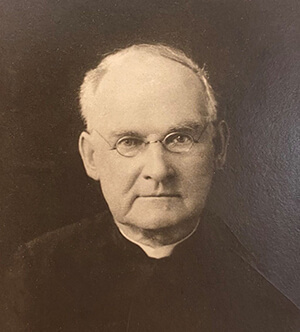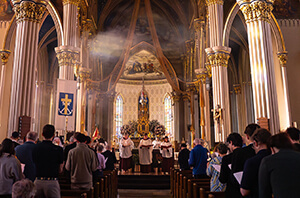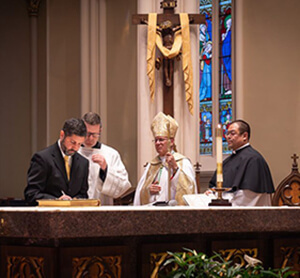
On Divine Mercy Sunday, 27 April, Most Rev. Kevin C. Rhoades, Bishop of the Diocese of Fort Wayne-South Bend, officially opened the cause for the beatification of Servant of God Columba O’Neill.
The Opening Session in the diocesan phase was held in the Basilica of the Sacred Heart on the campus of the University of Notre Dame in Notre Dame, Indiana, following the celebration of solemn Vespers. Many Holy Cross religious from the local area were in attendance, including Br. Ken Haders, C.S.C., Superior of the Midwest Province, and Fr. William Lies, C.S.C., Superior of the United States Province of Priests and Brothers.
Bishop Rhoades presided and preached at vespers. In his homily, he connected the deep devotion of Br. Columba to the Sacred Heart of Jesus with the Divine Mercy.
“Brother Columba was a great believer in the merciful love of Jesus and so had a deep and fervent devotion to the Sacred Heart of Jesus and spread that devotion by his words and deeds,” preached Bishop Rhoades. “It seems quite appropriate that we are officially initiating the cause on this Divine Mercy Sunday. The devotion to the Divine Mercy is inseparable from devotion to the Sacred Heart. The Sacred Heart of Jesus overflows with merciful love for us.”
Learn more about the life of Br. Columba

Bishop Rhoades also singled out for recognition and gratitude Br. Philip Smith, C.S.C., Archivist of the Midwest Province, who for several years has tirelessly and faithfully worked to promote knowledge of and devotion to Br. Columba.
During the Opening Session itself, the decree of Bishop Rhoades accepting the supplex libellus and appointing the various officials of the inquiry, including his Episcopal Delegate, the Promoter of Justice, the Notary, and the three members of the historical commission, was read.
Then, beginning with Bishop Rhoades himself, the various officials of the inquiry took their oaths of office, including Fr. Andrew Gawrych, C.S.C., Third Assistant and Vice Postulator, who was representing the Postulator, Dr. Valentina Culurgioni.
Read more about the Opening Session

In an interview with the local diocesan newspaper, Dr. Culurgioni explained how the cause of Servant of God Columba O’Neill will now proceed:
“During the diocesan inquiry, there are three main routes of investigation that aim to gather all testimonial and documentary evidence about the heroic virtues of the Servant of God and the persistent and growing reputation of his holiness and of signs attributed to him,” she explained. “First, the historical commission does research to collect all the documentation related to the life of the Servant of God and his reputation. As part of this work, the historians visit all the archives and libraries that could have documents, articles, books, etc., about the Servant of God, and they submit to the Tribunal a reproduction of all this documentation.”
“Second, the theologians read the writings of the Servant of God and evaluate its faith and morals to verify that there is nothing in the ideas and spirituality of the Servant of God that could be against the life and teachings of the Roman Catholic Church,” she continued. “Third, the Tribunal questions and collects the testimonies under oath of all the witnesses called by the Postulation, all the people who come forward to testify, and all the people that the Tribunal considers appropriate to summon.”

“These three avenues of inquiry are all aimed at collecting what is necessary to be able to ascertain the heroic virtues, reputation of holiness, and signs attributed to the Servant of God. Once this work is completed, the diocesan phase is officially closed by the bishop and the cause can move to the Roman phase,” said Dr. Culurgioni.
As the diocesan inquiry moves forward investigating the life, virtues, reputation of holiness, and signs of Servant of God Columba O’Neill, the Congregation of Holy Cross invites not only Christians, but all those seeking to be men and women with hope to bring to look to the life of this humble Holy Cross Brother.
“The example of Brother Columba’s love and compassion for every suffering human being can foster the question among the faithful: “How expansive is my love?” said Br. Smith. “By comparing their lives to those of the saints, especially those saints whose lives are eminently ‘sane and human,’ the faithful are encouraged to live their own flaws and foibles unto the betterment of the lives of all their brothers and sisters.”
“This is especially significant today in a world and a nation that are becoming increasingly ‘tribal’ with little tolerance for those who do not measure up to personal definitions of normal, ordinary, acceptable, worthy, or good,” continued Br. Smith. “According to Holy Cross Father Charles O’Donnell, who celebrated Brother Columba’s funeral Mass, the divine healer, the Miracle Man of Notre Dame, ‘worked till in the course of time and the providence of God the cobbler’s shop itself became a shrine. The humble shoemaker had somehow learned to mend immortal souls.’